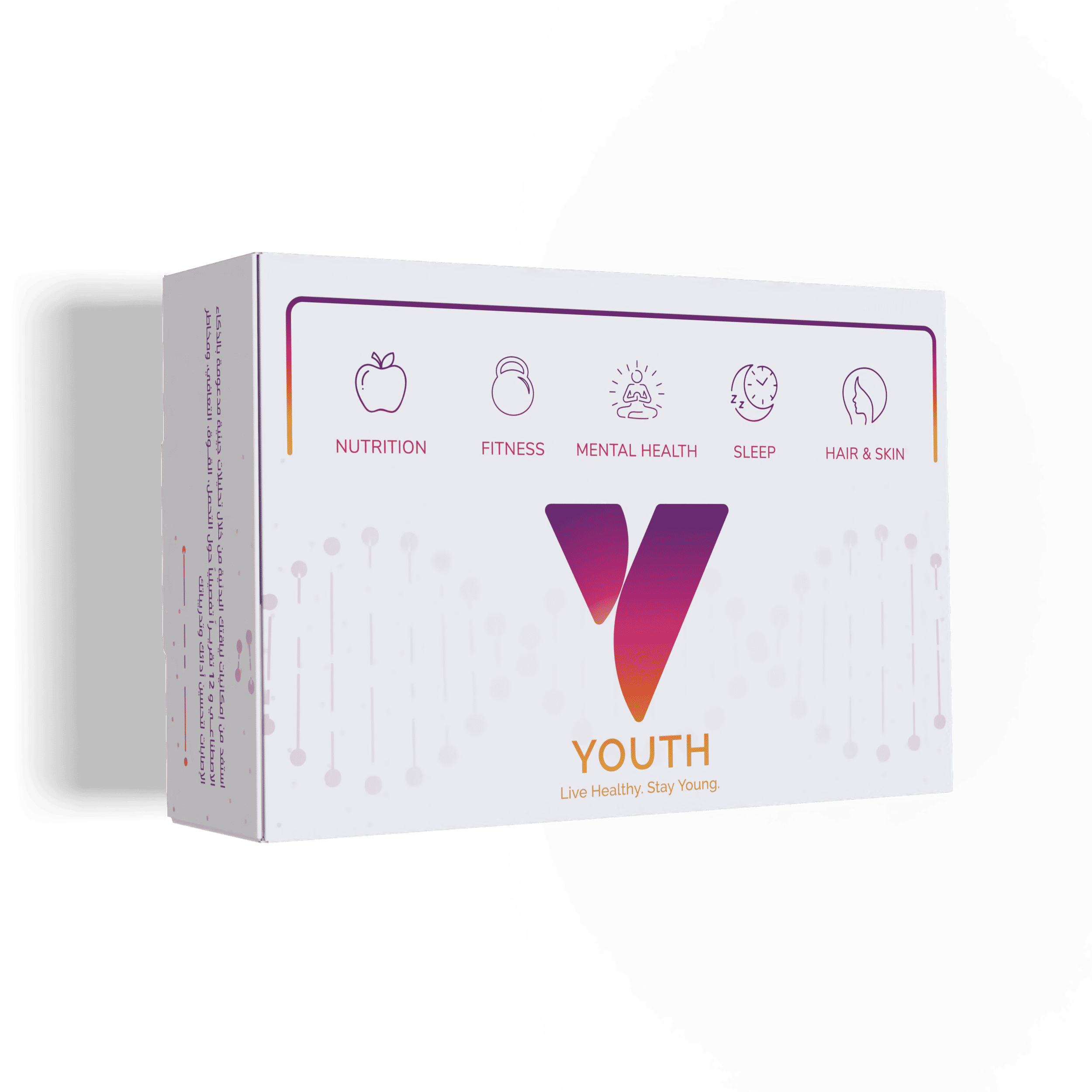
Revitalize your beauty
with DNA-derived insights
for skin and hair health.

Understand how your genetics influence skin aging, sun sensitivity, and hair resilience
Your skin and hair reflect more than just your lifestyle; they are influenced by the genetic blueprint that shapes your physical traits. The Hair and Skin Health Package provides personalized insights into how your DNA impacts the health and appearance of your skin and hair, helping you make informed decisions about skincare, hair care, and overall well-being.
“Your Journey to Personalized Beauty Starts Here”
Skin Aging:
Identify how your genetics influence your skin’s ability to resist aging signs like wrinkles and sagging.
Hydration:
Understand your skin's ability to retain moisture and how to keep it glowing and hydrated.
Hair Resilience:
Learn about the genetic factors that affect your hair’s thickness, growth cycle, and likelihood of thinning or loss.
Are you ready to
unlock your beauty potential?
Get started with the
Hair and Skin Health Package today!
If you have any questions, you are always welcome to contact us. We'll get back to you as soon as possible, within 24 hours on weekdays.
Shipping Information
Use this text to answer questions in as much detail as possible for your customers.
Customer Support
Use this text to answer questions in as much detail as possible for your customers.
FAQ’s
Use this text to answer questions in as much detail as possible for your customers.
Contact Us
Use this text to answer questions in as much detail as possible for your customers.
Sample Report

YOUTH Skin & Hair Program
Product details
12 Skin and Hair Health Traits to Optimize Beauty and Wellness
This comprehensive skin and hair health package analyzes 12 key traits that influence your skin’s appearance and your hair’s strength. It provides insights into how your body naturally responds to environmental factors like sun exposure, hydration, and skincare needs. Additionally, the test evaluates your hair characteristics, helping you understand its natural texture and how prone it may be to thinning or loss.
The report also examines your skin’s tendency toward conditions like dermatitis, eczema, psoriasis, and vitiligo, providing personalized guidance on how to care for your skin and prevent flare-ups. Understanding your skin's response to aging, sunburn, and pigmentation can help you make informed decisions about your skincare routine and sun protection.
Furthermore, the report dives into essential skin health factors like hydration and wrinkle risk, while also assessing your hair’s potential for curliness, waviness, or straightness. These insights allow you to tailor your hair care regimen and adopt a skincare routine that supports healthy, youthful skin and strong, full hair.
These genetic insights provide you with the tools to create a personalized skin and hair care plan that promotes lasting beauty, wellness, and confidence, ensuring your body’s natural characteristics are supported and enhanced.
Optimize Your Skin: Skin Aging and Appearance
This section focuses on two key genetic traits that impact your skin's aging process: Skin Age and Wrinkle Risk. These traits are influenced by genetic factors that regulate collagen production, skin elasticity, and repair mechanisms, which play a crucial role in determining how well your skin resists aging signs like fine lines, wrinkles, and reduced firmness.
- Skin Age: This trait reflects the biological age of your skin, based on your body's ability to produce collagen and elastin, which are essential for maintaining youthful, resilient skin. A high genetic score for Skin Age indicates your skin's ability to maintain collagen production and repair itself efficiently, which may slow down the visible signs of aging such as wrinkles and sagging. If your score is lower, your skin may produce less collagen and have slower repair mechanisms, which could lead to earlier aging signs. Understanding your Skin Age can guide you toward skincare strategies that focus on collagen-boosting ingredients, sun protection, and healthy lifestyle habits to maintain a youthful appearance.
- Wrinkle Risk: Wrinkle Risk is influenced by genetic factors that affect how your skin maintains its structure and elasticity. A high genetic score for Wrinkle Risk means your skin may show fine lines and wrinkles more quickly, as collagen and elastin are broken down at a faster rate. In contrast, a low genetic score suggests that your skin may maintain a smoother, firmer appearance for longer. Knowing your Wrinkle Risk can help you choose the right skincare products, such as collagen-supporting creams and sunscreens, to reduce wrinkle formation and maintain skin's smoothness over time.
How to Use This Information: By understanding your Skin Age and Wrinkle Risk, you can adjust your skincare routine to better support your skin's natural processes. If you have a high Skin Age score, focusing on protecting your skin from environmental damage and boosting collagen production through specific skincare ingredients (like retinol and vitamin C) will help preserve your skin's appearance. For Wrinkle Risk, early intervention with anti-aging products, sun protection, and healthy habits like hydration and a balanced diet can help slow the formation of fine lines and wrinkles. Understanding these genetic tendencies allows you to create a personalized approach to skincare that enhances your skin’s health and longevity.
Optimize Your Skin: Pigmentation, Tanning, and Sunburn Sensitivity
This section dives into how your genes influence your skin's pigmentation, tanning ability, and sensitivity to sunburn. Understanding these genetic traits empowers you to make informed decisions about sun protection and skincare, ensuring your skin stays healthy and protected from environmental stressors.
- Skin Pigmentation: Skin pigmentation is determined by the genetic regulation of melanin production, which affects both your natural skin tone and its ability to protect against UV radiation. A high genetic score for Skin Pigmentation suggests a higher level of melanin, offering better protection against UV rays but possibly making your skin more prone to pigmentation changes like dark spots. A low score indicates less melanin, often correlating with lighter skin and a higher sensitivity to sun damage. Understanding this trait helps guide your skincare routine to prevent pigmentation issues and ensure effective sun protection.
- Ease of Skin Tanning: The ease with which your skin tans is influenced by genetics that regulate how your skin produces and distributes melanin when exposed to UV light. A high genetic score for Ease of Skin Tanning suggests that your skin tans more easily, providing greater resilience to sun exposure. However, even with this advantage, sun protection is still critical. A low score indicates that your skin is more prone to burning and may struggle to tan, highlighting the importance of consistent sun protection to prevent damage.
- Sun Burn Risk: Sunburn risk is largely determined by your genetic ability to withstand UV radiation without skin damage. A high score for Sun Burn Risk means your skin is more sensitive to UV rays and is prone to redness and inflammation, increasing the risk of DNA damage from sun exposure. If your genetic score is low, your skin may have greater resilience to sunburn, but sun protection remains necessary to ensure long-term skin health.
How to Use This Information: By understanding your genetic traits related to skin pigmentation, tanning ability, and sunburn risk, you can tailor your sun protection strategies to suit your skin’s unique needs. For those with higher pigmentation or tanning scores, it’s important to protect your skin from overexposure to avoid future issues like pigmentation changes or skin damage. If you have a higher risk of sunburn, implementing rigorous sun protection measures such as broad-spectrum sunscreen, protective clothing, and limiting sun exposure is essential. These insights allow you to better care for your skin and reduce the risk of long-term damage from UV radiation.
Optimize Your Skin: Hydration and Resilience
This section focuses on how your genes influence your skin’s ability to retain moisture and maintain resilience against environmental stress. Genetics play a key role in determining how effectively your skin locks in moisture and preserves its protective barrier. These genetic factors are essential for hydration levels, skin strength, and the prevention of early aging signs, such as dryness and fine lines.
How to Use This Information: By understanding your skin's hydration and resilience tendencies, you can make targeted adjustments to your skincare routine. If your genetics suggest a strong ability to retain moisture, you can focus on maintaining hydration through lighter moisturizers and lifestyle choices like balanced nutrition. On the other hand, if your skin shows a tendency for dryness or reduced resilience, incorporating richer moisturizers, collagen-boosting ingredients, and hydration-focused skincare routines can help support your skin’s moisture retention and strengthen its protective barrier. This information enables you to develop a personalized skincare approach that enhances your skin's health and vitality over time.
Optimize Your Hair: Hair Characteristics and Health
This section focuses on two key genetic factors that influence your hair’s appearance, resilience, and overall health: Hair Shape Measurement and Hair Thinning and Hair Loss. Understanding these traits allows you to take proactive steps in caring for your hair and minimize the impact of thinning or loss over time.
- Hair Shape Measurement: Genetic factors play a significant role in determining your hair's natural shape, whether it’s straight, wavy, or curly. These traits are influenced by the shape of hair follicles and the angle at which the hair grows. A high genetic tendency for curly hair, for example, means that your hair structure naturally promotes more curls. Understanding this helps you choose the right hair care products and styling methods that align with your natural hair texture, minimizing damage and promoting healthy hair growth.
- Hair Thinning and Hair Loss: This trait is heavily influenced by genetics, particularly genes that regulate hair growth cycles and the structure of hair follicles. A higher genetic tendency for hair thinning and loss means your hair may be more susceptible to androgenic alopecia (pattern baldness), a common form of hair thinning that affects both men and women. Understanding your genetic predisposition for hair loss allows you to take early measures, such as using treatments or making lifestyle adjustments, to preserve and enhance hair thickness and vitality.
How to Use This Information: By understanding your hair’s genetic characteristics, you can tailor your hair care regimen to preserve its strength, volume, and health. For those with a higher tendency for hair thinning, incorporating products that promote hair growth and support follicle health, along with maintaining a balanced diet, can help slow down the process. For individuals with specific hair shapes, using the right tools and products designed for your hair texture can prevent unnecessary damage and enhance its natural beauty. These insights help you create a personalized hair care routine that optimizes your hair's health and appearance based on your genetic makeup.
Optimize Your Skin and Scalp: Managing Skin Conditions
This section explores the genetic factors that influence the likelihood of developing certain skin and scalp conditions, such as Dermatitis, Eczema, Psoriasis, and Vitiligo. Genetics play a significant role in determining skin sensitivity, immune response, and susceptibility to inflammation, all of which contribute to the development of these conditions.
- Dermatitis: This condition is often characterized by skin inflammation, which can result in redness, itching, and irritation. Genetic factors can make certain individuals more prone to inflammation and sensitivity, leading to increased susceptibility to dermatitis. Understanding your genetic tendency for dermatitis can help you select skincare products that soothe the skin and reduce irritation, as well as take preventive measures to avoid triggers like certain chemicals or allergens.
- Eczema: Eczema, a form of dermatitis, is linked to genetic factors that influence the skin's ability to retain moisture and defend against external irritants. Those with a genetic tendency for eczema may experience flare-ups, characterized by dry, itchy patches. Tailored skincare routines, including the use of hydrating and anti-inflammatory ingredients, can help manage symptoms and reduce flare-ups.
- Psoriasis: Psoriasis is an autoimmune condition that accelerates skin cell turnover, leading to thick, scaly patches. Genetic markers influencing the immune system and skin regeneration play a key role in determining the severity and frequency of psoriasis flare-ups. Understanding your genetic profile for psoriasis can help you incorporate appropriate treatments, such as anti-inflammatory creams or lifestyle adjustments, to manage and reduce outbreaks.
- Vitiligo: Vitiligo is a condition where the skin loses its pigment, resulting in lighter patches. It is influenced by genetic markers related to skin pigmentation and immune response. If you have a genetic tendency for vitiligo, understanding this can guide you in protecting your skin from further pigmentation loss, using sun protection, and seeking early treatments to preserve skin tone.
How to Use This Information: Understanding your genetic predisposition to these skin and scalp conditions allows you to tailor your skincare routine for better management. For example, individuals prone to dermatitis or eczema should focus on gentle, hydrating products that minimize irritation. Those with a genetic tendency toward psoriasis can benefit from anti-inflammatory treatments to reduce flare-ups. If you are at risk for vitiligo, ensuring proper sun protection and avoiding triggers can help manage pigmentation changes. These insights allow you to proactively manage your skin’s health, making informed decisions about skincare and scalp care based on your unique genetic makeup.